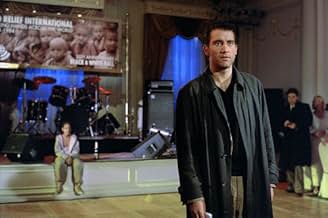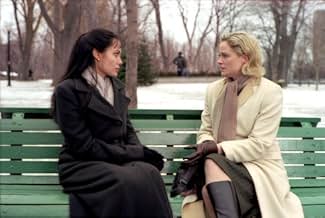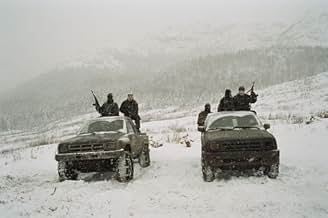CALIFICACIÓN DE IMDb
6.4/10
29 k
TU CALIFICACIÓN
La crueldad del mundo se enfrenta al amor de dos personas diferentes que intentan salvar a la humanidad de la pobreza y la guerra.La crueldad del mundo se enfrenta al amor de dos personas diferentes que intentan salvar a la humanidad de la pobreza y la guerra.La crueldad del mundo se enfrenta al amor de dos personas diferentes que intentan salvar a la humanidad de la pobreza y la guerra.
- Premios
- 2 nominaciones en total
Jonathan Higgins
- Philip
- (as Johnathan Higgins)
Keelan Anthony
- Jojo
- (as Keelan Anthony Ray Forsythe)
Norman Mikeal Berketa
- Police Officer
- (as Norm Berketa)
- Dirección
- Guionista
- Todo el elenco y el equipo
- Producción, taquilla y más en IMDbPro
Opiniones destacadas
I am appalled to see that the overall IMDb rating for this movie is only 5.2 (edit: now down to 4.9! Madness! Later edit: Ah, now it's up to 5.4 - still abysmal. Oh, and now it's up to 5.9 - going the right way, at least!). Hopefully posterity will be kinder to it than that. It is a very good, well-acted, well-written and well-filmed movie. Apparently, though, it is too subtle for many viewers.
The humanitarian situation it shows is reality. The characters may be fictional, and they may not be representative of the typical relief worker - but they aren't supposed to be. This is a story of those particular two people, and how their feelings for each other grow out of the humanitarian work they are embroiled in. There's no separating the love story from the relief efforts, because she falls in love with him because of his commitment to those efforts. It's true that, at the end in Chechnya, she is more interested in him than in the local situation, but there are two very good reasons for this: One, unlike in Ethiopia and Cambodia she was only there to find him; she wasn't involved in some relief work there, so obviously his safety was foremost in her mind. And two, and more importantly, if she managed to save him, he could have continued being the man she fell in love with; continued his courageous commitment to fight death and suffering. So, I repeat, the love story and the humanitarian subject matter of this movie cannot been separated.
And the thing about her leaving her own family; fer crying out loud, it wasn't a happy family! Her cheating husband represented, both to Angelina's character and in a wider metaphorical sense, the numbing meaninglessness of a trivial, awkward and frequently loveless domestic situation, compared to the importance of saving lives and being in the company of infinitely more inspiring people.
(And what a refreshing change to see her husband - Linus Roach - in the kind of role that so many women portray in the usual Hollywood movie, being the colorless, passive backdrop to the male hero. Gratifying to see it reversed, for once.)
The ending of the movie was unexpected, and yet, in retrospect, it couldn't have ended any other way. If the movie were serious about its subject matter - the relief efforts *as well* as the love story -, it required an end of that sort. The surviving daughter keeps the hope for an eventual happy end alive.
I'm saddened that so many people did not "get" the movie. Many of the criticisms leveled against it are of scenes that were *meant* to evoke that response, and which are addressed later in the movie. There's a development going on; the characters are growing in the course of the story, and so is the movie. Many people apparently couldn't perceive that.
This was an extremely well-structured, rare, thought-provoking and sobering type of movie that I'm thankful could get made in this day and age (and I've just bought the DVD). But what a pity it met with such an insensitive public response.
9 out of 10.
The humanitarian situation it shows is reality. The characters may be fictional, and they may not be representative of the typical relief worker - but they aren't supposed to be. This is a story of those particular two people, and how their feelings for each other grow out of the humanitarian work they are embroiled in. There's no separating the love story from the relief efforts, because she falls in love with him because of his commitment to those efforts. It's true that, at the end in Chechnya, she is more interested in him than in the local situation, but there are two very good reasons for this: One, unlike in Ethiopia and Cambodia she was only there to find him; she wasn't involved in some relief work there, so obviously his safety was foremost in her mind. And two, and more importantly, if she managed to save him, he could have continued being the man she fell in love with; continued his courageous commitment to fight death and suffering. So, I repeat, the love story and the humanitarian subject matter of this movie cannot been separated.
And the thing about her leaving her own family; fer crying out loud, it wasn't a happy family! Her cheating husband represented, both to Angelina's character and in a wider metaphorical sense, the numbing meaninglessness of a trivial, awkward and frequently loveless domestic situation, compared to the importance of saving lives and being in the company of infinitely more inspiring people.
(And what a refreshing change to see her husband - Linus Roach - in the kind of role that so many women portray in the usual Hollywood movie, being the colorless, passive backdrop to the male hero. Gratifying to see it reversed, for once.)
The ending of the movie was unexpected, and yet, in retrospect, it couldn't have ended any other way. If the movie were serious about its subject matter - the relief efforts *as well* as the love story -, it required an end of that sort. The surviving daughter keeps the hope for an eventual happy end alive.
I'm saddened that so many people did not "get" the movie. Many of the criticisms leveled against it are of scenes that were *meant* to evoke that response, and which are addressed later in the movie. There's a development going on; the characters are growing in the course of the story, and so is the movie. Many people apparently couldn't perceive that.
This was an extremely well-structured, rare, thought-provoking and sobering type of movie that I'm thankful could get made in this day and age (and I've just bought the DVD). But what a pity it met with such an insensitive public response.
9 out of 10.
Beyond Borders brings to light the very realistic struggles of the millions of refugees created by war and the valiant efforts of aid workers who contribute to their survival in spite of overwhelming odds. The storyline of crossing your life's borders away from a comfortable life to help other struggling human beings is a story worth being told. In this type of humanitarian experience, every aid worker I have come into contact with has described the experience as extremely enriching. I'm saddened most of America did not embrace this subject matter at the box office. We, as Americans, live a very comfortable life comparatively, and perhaps it's out of fear, complacency or just selfishness that we generally do not cross borders to help fellow human beings. This attitude does not make us very popular around the world, but perhaps if more people become aware and did something to help other people in their struggles, the world would be a better and safer place to live.
As a journalist who covered the Afghan / Soviet war, recently watching the "Making of" on the DVD was compelling to see how the filmmakers made something so realistic without putting their cast or crew in harms way. I hope this film will be embraced as a DVD so that studios will continue to make films of solid subject matter. Angelina Jolie was well-cast in this role for she (in real life) is the Ambassador for the United Nations High Commission of Refugees (UNHCR). She brought much passion into this role, and while she appeared a little "girlish" initially, the character had to grow out of her pampered life for us to follow her across the borders both real and metaphoric. I am pleased she was brave enough to embrace such a role, and hope she will continue to grow in her range of acting choices. Noah Emmerich reminded me of a very gentle Aid worker I knew killed on the job, which tugged at my heart strings. While Clive Owen's portrayal of a man who closes off his heart to survive the cruelty of every day life in the war zone is accurate, for the general public who has probably not lived through these extreme conditions, it's difficult to empathize or care. I'm sure that is why there might be a general dislike of this character. For a handful of my friends, the romantic connection was unrealistic, but in reality if you're living day to day in such extreme conditions and you're friend dies, you'll let down your guard just to feel alive. I'm sure a lot of people had sex just after the Sept. 11 attacks.
The excellent production design, cinematography and poignant music moved the story forward, but while I loved this subject matter, I also felt the transitions between three very distant locations caused the film to feel somewhat disjointed. Perhaps that was due to "behind the scene" budget constraints (maybe some transition scenes were cut before they could shoot them) or perhaps some studio executive was pushing the film out to theaters before the cut was ready because the investors were crying out for their ROI. Who knows what the politics were...
Either way, I liked the film, am going to buy the DVD and will definitely recommend it to anyone who wants to be inspired beyond their own border. I certainly was.
As a journalist who covered the Afghan / Soviet war, recently watching the "Making of" on the DVD was compelling to see how the filmmakers made something so realistic without putting their cast or crew in harms way. I hope this film will be embraced as a DVD so that studios will continue to make films of solid subject matter. Angelina Jolie was well-cast in this role for she (in real life) is the Ambassador for the United Nations High Commission of Refugees (UNHCR). She brought much passion into this role, and while she appeared a little "girlish" initially, the character had to grow out of her pampered life for us to follow her across the borders both real and metaphoric. I am pleased she was brave enough to embrace such a role, and hope she will continue to grow in her range of acting choices. Noah Emmerich reminded me of a very gentle Aid worker I knew killed on the job, which tugged at my heart strings. While Clive Owen's portrayal of a man who closes off his heart to survive the cruelty of every day life in the war zone is accurate, for the general public who has probably not lived through these extreme conditions, it's difficult to empathize or care. I'm sure that is why there might be a general dislike of this character. For a handful of my friends, the romantic connection was unrealistic, but in reality if you're living day to day in such extreme conditions and you're friend dies, you'll let down your guard just to feel alive. I'm sure a lot of people had sex just after the Sept. 11 attacks.
The excellent production design, cinematography and poignant music moved the story forward, but while I loved this subject matter, I also felt the transitions between three very distant locations caused the film to feel somewhat disjointed. Perhaps that was due to "behind the scene" budget constraints (maybe some transition scenes were cut before they could shoot them) or perhaps some studio executive was pushing the film out to theaters before the cut was ready because the investors were crying out for their ROI. Who knows what the politics were...
Either way, I liked the film, am going to buy the DVD and will definitely recommend it to anyone who wants to be inspired beyond their own border. I certainly was.
10strizzy_
This movie leaves you speechless, and takes you to a new emotional level. I feel this movie will not reach people like it should though... People and Middle America will pass it off and just play it up as Hollywood hype and just really not want to acknowledge what is happening in the real world... This movie is a 10 and I just hope it can bring light to subject matters that just get pushed under the carpet.
No one can accuse 'Beyond Borders' of not having its heart in the right place. After all, how many mainstream American movies so much as acknowledge the existence of starving people in the world, let alone make them the centerpiece of their stories? For its willingness to do that, the film deserves a certain amount of genuine praise. Unfortunately, having gone this far, the filmmakers then cheapen it all by pasting onto the film a corny, superficial love story more appropriate to a Harlequin Romance than an ostensibly serious social drama.
Angelina Jolie plays a United Nations relief worker who flits from one worldwide trouble spot to another - Africa, Cambodia, Chechnya - dispensing aid and carrying on an adulterous affair with a handsome field doctor (played by Clive Owen) whom she met several years earlier (the film takes place in the 1980's and '90's). It's a little hard to take seriously the extreme plight of these suffering people when Sarah and Nick are making goo-goo eyes at one another in between saving lives and delivering inspirational, we-are-the-world speeches. As with so many movies of this type, the put-upon, indigenous people become little more than extras in their own story, a mere backdrop for the trite personal drama occupying center stage. It's as if American audiences couldn't possibly find any interest or relevance in all this misery if we didn't have some well-fed, well-scrubbed white people serving as our guide to get us through it all. I'm sure that the last thing the people who made this movie intended was to in any way demean the incredible efforts done by relief workers around the world, yet that is exactly what they end up doing by forcing all this heartbreaking human tragedy through the funnel of a hackneyed love story.
The moments of highest interest come when we see the incredible amount of power politics that goes on even when it comes to delivering food and medicine to dying people - although the filmmakers don't always make those complicated logistics entirely clear for the lay audience. We often can't tell what exactly is happening on a socio political level that's preventing the aid from getting through. A little less time spent on the romance and a little more on the behind-the-scenes aspects of the story would have gone a long way towards redeeming the film. Unfortunately, there's something almost comical about the sight of Sarah and Nick, nattily dressed and perfectly coiffed, making passionate love amidst the rubble and ruin of war torn Chechnya.
Jolie and Owen turn in relatively lackluster performances, not entirely their fault given the stock characters they play and the bland dialogue they've been assigned to deliver. Jolie has one basic expression throughout - that of teary-eyed sympathy and concern - that wears awfully thin after awhile.
The filmmakers are highly critical of all those well-off people who merely pay lip service to helping Third World causes but who are really only concerned with salving their own guilty consciences (the film begins at one of those lavish fund raising dinners with everyone dressed to the nines and enjoying a sumptuous banquet while they're giving one another awards for great humanitarian achievements for helping to eradicate poverty and hunger). Yet, by treating the material as if it were some sort of bourgeois romantic fantasy, the movie makers are, in many ways, doing the very same thing they accuse the elite snobs of doing - which is making misery palatable and easily digestible for the complacent, self-satisfied masses.
'Beyond Borders' is, obviously, a labor of love for all those involved in its making. That is turns out to be a misfire of almost laughably bad proportions is, perhaps, the greatest tragedy of all.
Angelina Jolie plays a United Nations relief worker who flits from one worldwide trouble spot to another - Africa, Cambodia, Chechnya - dispensing aid and carrying on an adulterous affair with a handsome field doctor (played by Clive Owen) whom she met several years earlier (the film takes place in the 1980's and '90's). It's a little hard to take seriously the extreme plight of these suffering people when Sarah and Nick are making goo-goo eyes at one another in between saving lives and delivering inspirational, we-are-the-world speeches. As with so many movies of this type, the put-upon, indigenous people become little more than extras in their own story, a mere backdrop for the trite personal drama occupying center stage. It's as if American audiences couldn't possibly find any interest or relevance in all this misery if we didn't have some well-fed, well-scrubbed white people serving as our guide to get us through it all. I'm sure that the last thing the people who made this movie intended was to in any way demean the incredible efforts done by relief workers around the world, yet that is exactly what they end up doing by forcing all this heartbreaking human tragedy through the funnel of a hackneyed love story.
The moments of highest interest come when we see the incredible amount of power politics that goes on even when it comes to delivering food and medicine to dying people - although the filmmakers don't always make those complicated logistics entirely clear for the lay audience. We often can't tell what exactly is happening on a socio political level that's preventing the aid from getting through. A little less time spent on the romance and a little more on the behind-the-scenes aspects of the story would have gone a long way towards redeeming the film. Unfortunately, there's something almost comical about the sight of Sarah and Nick, nattily dressed and perfectly coiffed, making passionate love amidst the rubble and ruin of war torn Chechnya.
Jolie and Owen turn in relatively lackluster performances, not entirely their fault given the stock characters they play and the bland dialogue they've been assigned to deliver. Jolie has one basic expression throughout - that of teary-eyed sympathy and concern - that wears awfully thin after awhile.
The filmmakers are highly critical of all those well-off people who merely pay lip service to helping Third World causes but who are really only concerned with salving their own guilty consciences (the film begins at one of those lavish fund raising dinners with everyone dressed to the nines and enjoying a sumptuous banquet while they're giving one another awards for great humanitarian achievements for helping to eradicate poverty and hunger). Yet, by treating the material as if it were some sort of bourgeois romantic fantasy, the movie makers are, in many ways, doing the very same thing they accuse the elite snobs of doing - which is making misery palatable and easily digestible for the complacent, self-satisfied masses.
'Beyond Borders' is, obviously, a labor of love for all those involved in its making. That is turns out to be a misfire of almost laughably bad proportions is, perhaps, the greatest tragedy of all.
Perhaps lingering is the wrong word, since as I write this, I only left the theater about 30 minutes ago... But I can still feel my heart clenched in my chest, and my mind is still rolling back and forth over what I've just seen. In my experience, those are the kinds of films that stay with you.
There have been a lot of reviews on both sides as far as Beyond Borders goes, and I think it comes down to knowing yourself as a movie viewer. Beyond Borders presents you with a glimpse of the world, and it asks you to believe in it, to internalize it. If you're the kind of person who can EXPERIENCE a film, rather than just kick back and watch it, than you'll be brushing flies out of your eyes, and jumping at every sudden burst of gunfire. You'll be overwhelmed by the desperation around you, and you'll feel despair, and helplessness, and you'll think "Good for those people who go to Ethiopia/to Chechnya/to Cambodia. I'm so glad someone's helping," and then deep down, you'll be ashamed to realize that you think that just because you elected to see a movie about Relief Workers rather than The Texas Chainsaw Massacres, you deserve some sort of gold star.
And yes, there is the love story. And if you love love stories (as do I) you'll love this one. Again, it comes down to how much you'll let your self believe in a movie, and how much you expect to be convinced. Certainly, I would NEVER accuse Angelina Jolie and Clive Owens of sharing no chemistry, as I was completely unable to breathe during most of the scenes they shared. Both actors excelled in their roles, together and separately.
No, it wasn't fast-paced. It wasn't full of witty acerbic dialogue, or fantastic car chases. There were no jokes about bodily functions. It was just sincere, and powerful, and good (in every sense of the world). Though it was by no means perfect, I gladly rated it a 10 for excellence.
There have been a lot of reviews on both sides as far as Beyond Borders goes, and I think it comes down to knowing yourself as a movie viewer. Beyond Borders presents you with a glimpse of the world, and it asks you to believe in it, to internalize it. If you're the kind of person who can EXPERIENCE a film, rather than just kick back and watch it, than you'll be brushing flies out of your eyes, and jumping at every sudden burst of gunfire. You'll be overwhelmed by the desperation around you, and you'll feel despair, and helplessness, and you'll think "Good for those people who go to Ethiopia/to Chechnya/to Cambodia. I'm so glad someone's helping," and then deep down, you'll be ashamed to realize that you think that just because you elected to see a movie about Relief Workers rather than The Texas Chainsaw Massacres, you deserve some sort of gold star.
And yes, there is the love story. And if you love love stories (as do I) you'll love this one. Again, it comes down to how much you'll let your self believe in a movie, and how much you expect to be convinced. Certainly, I would NEVER accuse Angelina Jolie and Clive Owens of sharing no chemistry, as I was completely unable to breathe during most of the scenes they shared. Both actors excelled in their roles, together and separately.
No, it wasn't fast-paced. It wasn't full of witty acerbic dialogue, or fantastic car chases. There were no jokes about bodily functions. It was just sincere, and powerful, and good (in every sense of the world). Though it was by no means perfect, I gladly rated it a 10 for excellence.
¿Sabías que…?
- TriviaAll the villages in exotic locations were authentic. The crews installed real running water for the grateful villagers. Some of them had never even seen a white man until then.
- ErroresJimmy Bauford is 4 years old in the 1989 segment and 10 years old in the 1995 segment. He is played by the same child actor in both segments, and he does not age a day.
- Citas
[last lines]
Sarah Jordan: You have always been with me. Your courage, your smile, your damned stubbornness. There has never been any distance between us, and there never will be. I love you Nick. I love you.
- Créditos curiososThis film is dedicated to all relief workers and the millions of people who are victims of war and persecution. They continue to inspire us all with their courage and will to survive.
- ConexionesFeatured in Seis pies bajo tierra: The Rainbow of Her Reasons (2005)
Selecciones populares
Inicia sesión para calificar y agrega a la lista de videos para obtener recomendaciones personalizadas
- How long is Beyond Borders?Con tecnología de Alexa
Detalles
- Fecha de lanzamiento
- Países de origen
- Idiomas
- También se conoce como
- Beyond Borders
- Locaciones de filmación
- Productoras
- Ver más créditos de la compañía en IMDbPro
Taquilla
- Presupuesto
- USD 35,000,000 (estimado)
- Total en EE. UU. y Canadá
- USD 4,430,101
- Fin de semana de estreno en EE. UU. y Canadá
- USD 2,076,402
- 26 oct 2003
- Total a nivel mundial
- USD 11,705,002
- Tiempo de ejecución2 horas 7 minutos
- Color
- Mezcla de sonido
- Relación de aspecto
- 2.39 : 1
Contribuir a esta página
Sugiere una edición o agrega el contenido que falta

Principales brechas de datos
What is the French language plot outline for Más allá de las fronteras (2003)?
Responda






























